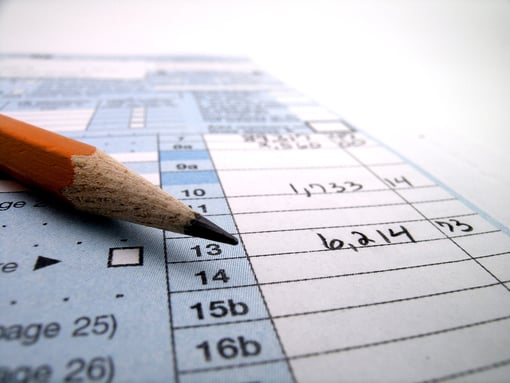Are You Taking the Proper Precautions this Tax Season?
Tue, Feb 07, 2023
By: Jim Beran

It’s tax season, which means that you are getting tax forms in the mail, via email and downloading them from various employers, stock trading accounts, banks, and other accounts. You may be doing your taxes online. You should ensure that your data stays safe as it travels through cyberspace. All sites should be secure – they will have an “HTTPS” instead of “HTTP.” You should also use encryption for your email.
Tax Season Shredding: Keeping Your Data Safe
You’ll most likely print any documents you download and send some to the Internal Revenue Service. Others you should keep for the recommended amount of time. Before you start taxes this year, go through your tax files and remove any document that has reached the end of its retention period. Place them in a secure spot until you are ready to shred them.
These are documents that you should not shred with a home shredder, as most home shredders do not create small enough pieces, especially if it’s not a cross-cut shredder. Identity thieves can recreate documents if the pieces are not small enough.
Once you complete the current year’s taxes, add any documents you don’t need to keep to the shred pile, then contact Gilmore to schedule an appointment for shredding documents. This is the best way to keep your data safe once it’s on paper.
Additional ways to keep your data safe include:
- Do not click on unknown popups and links, and do not open unknown emails.
- You should change your passwords frequently – and when you do, use a strong password. You should also use two-factor authentication for all accounts where you store credit card information.
- Make sure your Wi-Fi connection is secure.
- Install a firewall if your computer doesn’t have one yet.
- Install security software and back up your files. Back them up to a secure cloud account and an external hard drive.
Shredding Documents: Why Use a Professional Document Shredding Company
Shredding documents is the best way to keep your data safe from identity thieves. Gilmore has locked shred boxes you can use to store documents until it’s time for us to shred them. Businesses might use several shred boxes. Individuals who run a home business might use one or two, depending on how much paper goes through the business.
Depending on the complexity of your taxes, tax season shredding could take up significant space in a locked shred box. Documents you should shred include:
- Bank statements.
- Old tax returns.
- Retirement account statements.
- Credit card statements.
- Supporting tax documents.
- Old bills – these should be shredded two to three months after you pay them.
- Pay stubs.
- Old medical records.
Individuals should shred anything with their address, phone number and social security number. Businesses should shred anything with client or employee information and documents relating to the business if they have reached the end of their retention period.
An identity thief might need just one piece of information to complete a full profile of a person and steal his or her identity. Shredding any document with personal information significantly lowers the risk of identity theft.
Contact Gilmore
Now that it’s tax time, businesses and individuals should consider obtaining a shred box to keep old documents safe until it’s time for your shredding appointment. Contact Gilmore today for a shredding appointment and more information about our services.